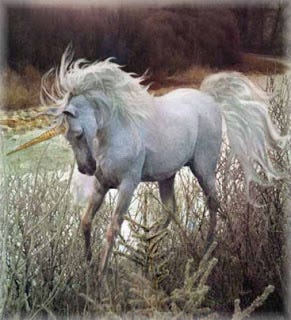The unicorns in the Bible

Picture from here.
This post has nothing at all to do with anything except that my niece turns five soon, and she, for some reason, has a love of unicorns. I am not one of those people who doesn’t approve of children engaging in play with creatures of mythical or imaginary origins, so I’ve bought a unicorn, but I was curious, so I googled unicorns, and went where everybody ends up: Wikipedia.
However, what I discovered there is that unicorns don’t actually have mythological origins. This is what is says:
Unicorns are not found in Greek mythology, but rather in accounts of natural history, for Greek writers of natural history were convinced of the reality of the unicorn, which they located in India, a distant and fabulous realm for them.
What’s more, apparently the Authorised King James Bible of 1611 is full of references to unicorns (see Wikipedia for the references):
The translators of the Authorized King James Version of the Bible (1611) followed the Greek Septuagint (monokeros) and the Latin Vulgate (unicornis) and employed unicorn to translate re'em, providing a recognizable animal that was proverbial for its un-tamable nature.
Perhaps those students of the bible and Greek already knew this, but does anyone else not find this peculiar? I don’t know what I’d think if I came across the word “unicorn” in my Bible.
The wiki article is quite interesting. I find it rather amusing that the origin of the folklore of the unicorn is perhaps the rhinoceros. It’s also my personal opinion that dugongs are the source of the legends of mermaids, which is equally amusing.
Anyway, apparently in medieval folklore unicorns were known as symbols of purity and grace. I think that is the line I will take with my niece, should she be asking.

